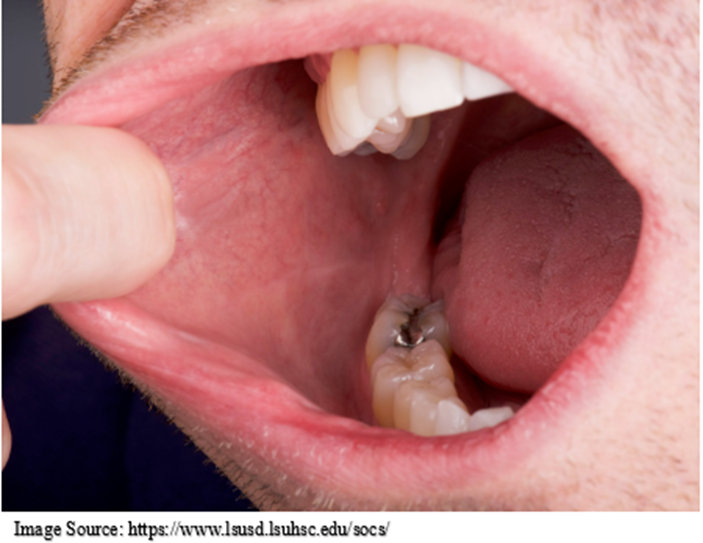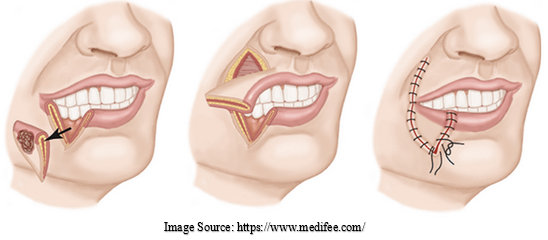Surgical removal of malignant tissue is the most common treatment for those diagnosed with oral or mouth cancer, particularly in cases where disease is in its early stages. Depending on the size and extent of your cancer and its removal, your surgical team will undertake reconstructive oral cancer surgery to address changes in the appearance or function of the mouth, jaw, or throat resulting from the cancer surgery.
Following mouth cancer surgery, plastic surgeons can assist in restoring the afflicted areas of your oral cavity.
Plastic surgeons often undertake reconstructive surgery to replace the soft tissue, teeth, and bone that might need to be removed during oral cancer surgery.
During reconstruction, the oral cavity is reconstructed using bone and/ or tissue from another body part. Microvascular surgery, in which surgeons cut and stitch together tiny blood vessels under a microscope, can be used to transfer this tissue—this aids in re-establishing blood flow to the tissue in the defect area.
Rebuilding structures that support the mouth’s functions—such as speaking and chewing food—often uses microvascular reconstructive surgery. If teeth are lost, dental implants might also be required.

According to Dr. Leena Jain, a reputed plastic surgeon in Mumbai, if you are knowledgeable about oral cancer surgery reconstruction procedures, you can discuss your alternatives with your cancer surgeon more effectively. Moreover, Dr. Leena Jain has over seven years of experience and expertise in reconstructive microsurgery, hand surgery, burn reconstruction, breast surgery, and cosmetic procedures.
In this article, we will discuss things you should know about reconstructive plastic surgery after oral cancer.
Read on to learn more.
Now, let’s see,
Who is a candidate for oral cancer reconstruction?
Patients needing a significant amount of facial or neck soft tissue, or upper or lower jaw bone portions is removed due to medium- to large-sized tumors may be candidates for surgical reconstruction.
Dr. Leena Jain, a highly skilled plastic surgeon in Bandra, Mumbai, can review all your options for repairing the surgical area’s structure and functionality.
Let’s look at the,
Different Techniques Used in Oral Cancer Reconstruction Surgery
Plastic surgeons employ several reconstructive methods depending on the area that needs reconstruction. Your quality of life may be improved by these surgeries, which may be highly helpful in assisting you in regaining function and looks.

Some of the most common reconstructive procedures include:
- Flap tissue transfer:
When removing larger sections of malignant tissue, surgeons replace them with flaps or tissue sections that comprise skin, muscle, and fat rather than just skin. Flaps are usually taken from a site distant to head and neck region. such as the abdomen or leg. During the flap transfer process, small blood vessels supplying the flap are identified and dissected with the flap.
Flap is then transferred into the defect and anastomosis is done with surrounding blood vessels. Anastomosis means joining of artery to artery and vein with a vein, so as to establish connectivity between bloood vessels for the blood to flow into the flap and keep it alive. The affected area may need to be repaired by microvascular surgery. This promotes tissue health and restores functionality. To re-establish movement and sensation at the site, surgeons might also graft nerves.
- Dental implants:
They can be used to restore missing teeth in cases where oral cancer surgery is necessary. Your jawbone will be fixed with tiny titanium screws by the dentist. The dentist places substitute teeth over the screw posts when your tissue has grown over the exposed metal.
- Bone graft:
If surgeons need to remove a portion of your jaw, they can use bone from your leg, rib, or other areas to replace the jawbone. Before removing the bone, your medical team will take images or perform imaging tests of your face to match your appearance throughout reconstruction.
The hard palate, the bony region in the upper part of your mouth, and the lower jaw may occasionally have some missing jawbone filled in by using specially formed synthetic implants or metal plates.
Recovery from Oral Cancer Reconstruction
The extent of the surgical incisions and your general health will impact how quickly you recover from oral cancer reconstructive surgery. Average recovery trime is about 10-12 days and hospitalization is not required. Patients often see exceptional outcomes thanks to recent advancements in reconstructive plastic surgery after oral cancer.
Speak with your doctor about the options available if you are having surgery for oral cancer to help you feel ready and prepared.

